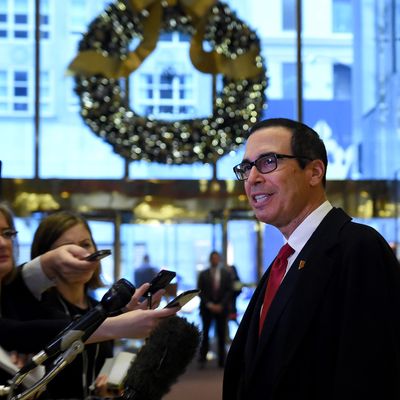
One of the many ugly ironies of Donald Trump’s political ascent, was the fact that a billionaire real-estate heir managed to brand himself as a populist class traitor — even as he campaigned on a regressive tax cut that would primarily benefit his fellow plutocrats.
Since winning the White House, Trump has made no effort to resolve the tension between his message and his agenda. The president-elect’s final campaign ad featured a vow to end Wall Street’s influence in Washington, and portrayed the chief executive of Goldman Sachs as the personification of a globalist elite who had “robbed our working class.”
On Tuesday, Trump named a former Goldman Sachs partner — who is also the son of a former Goldman Sachs partner — as his pick for Treasury secretary, while picking Wilbur Ross — a billionaire who ignored safety violations at a mine he owned, until said violations killed 12 workers — as his choice to head the Department of Commerce.
Trump is also, reportedly, considering the president of Goldman Sachs to lead the Office of Management and Budget.
But fear not, middle-class Americans — Trump’s Treasury pick has informed CNBC that the president-elect’s giant tax cut for the rich does not, in fact, cut taxes on the rich.
“Any reductions we have in upper-income taxes will be offset by less deductions so that there will be no absolute tax cut for the upper class,” Steve Mnuchin, who named his hedge fund after the sand dunes near his beach house in the Hamptons, told “Squawk Box” Wednesday morning. “When we work with Congress and go through this, it will be very clear. This is a middle-income tax cut. And the child-care credit is a big aspect of this.”
This would be welcome news if it weren’t so difficult to believe. When the nonpartisan Tax Policy Center scored Trump’s plan last month, it found that the top 0.1 percent of earners would see their after-tax income increase by an average of more than 14 percent — for households in the middle fifth of the income ladder, that figure was 1.8 percent. In other words: The plan provided the super rich with a benefit seven times larger than that bestowed on the middle class.
Unless Trump has radically revised the marginal rates in his plan, Mnuchin is almost certainly lying in his interview to CNBC. There’s no way a tax break that large can be erased through the elimination of deductions — especially considering that Mnuchin told the network that Trump would not be abolishing the deductions for mortgage interest or charitable donations (though he did say they would put a cap on the former).
What’s more, no matter what the details of Trump’s official tax plan are, the super rich already stand to enjoy a major tax cut the moment that the Affordable Care Act is repealed.
All of which is to say, when the founder of Dune Capital Management tells you that the billionaire president’s fiscal agenda offers no net benefit to the upper class, don’t give him the benefit of the doubt.






























